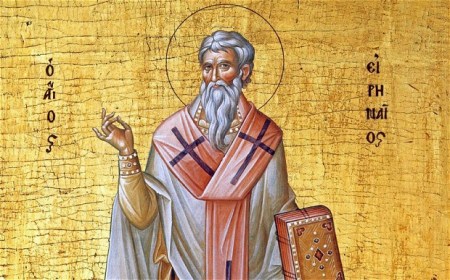
I have much enjoyed reading Joel Edmund Anderson’s blog, resurrecting orthodoxy. So much that I am reblogging his latest post which is part of a walk through Genesis: Making Sense of Genesis 3 (Part 1): The Big Picture, Nakedness, and Two Trees. Knowing history allows us to avoid the mistakes of those who came before us, but not knowing history makes it likely that we will repeat those mistakes.
So it seems that some have made the mistake in this modern day and age of reading Genesis too literally. Just suggesting that triggers a slight shudder as I can imagine someone taking umbrage with the suggestion that we shouldn’t take the Bible literally.
I maintain that we should take the Bible seriously, which means that we should let the Bible inform us when we should read it literally, when we should read it figuratively, and when it has both literal and figurative meanings. (Should we take the Bible Literally? Or Seriously?)
Anderson reminds us that this is how some of the most influential early church fathers viewed Scripture. For authority, he cites all the way back to Irenaeus, the disciple of Polycarp who was a direct disciple of John – the disciple of Jesus and writer of the Gospel, epistles and Revelations. Irenaeus is just one spiritual generation removed from Jesus.
I realize that people might want simple formulas for Bible interpretation, but there is nothing simple about the universe we live in, reality or (most of all) God.
His ways are higher than our ways. We shouldn’t lean on our own understanding. Jesus left the Holy Spirit to guide us into all truth, and Jesus said we must learn to worship God in spirit and truth.
I am not talking about New Age spiritualism or secret Gnostic knowledge. The Living God spoke to Abraham and David and took on human form in the body of Jesus, lived obediently to His own purpose as a man to the point of dying on a cross for our sins and rising from the dead in that same body to give us hope. This is the uncreated Word of God who was with God in the beginning, and was God, and through whom all that was created was made – the seen from the unseen.
Anderson says in his latest article:
“Genesis 3 was not claiming that God had created a ‘perfect’ world, because God alone is perfect. In fact, Irenaeus called the teaching that Adam and Eve were originally ‘perfect’ a gnostic heresy. Irenaeus was emphatic: God didn’t create Adam and Eve as ‘perfect’ beings.”
God called the world He made “good” (not perfect). It was good for His intended purpose, and it still is.
He certainly knew humanity would fall and fail. That was inevitable because we are not perfect; we are not God. God knew we would fail because He can see the end from the beginning, and everything in between. When He hit the “start” button on the creation, He saw how His purpose would unfold before the foundations of the earth. And, He saw that it was good.
Through our experience we learn good and evil, and the value of embracing good and rejecting evil. In this way, our experience is intended to lead us to God who alone is perfect. Through our experience, we learn to rely not on ourselves, but on God. Through our experience we learn to embrace God and His purpose. As we yield ourselves to Him, God works in us what we could never do in ourselves – perfecting us in Him.
We make a critical mistake when we think that Adam and Eve and Eden were perfect. Only God is perfect.
I’ve heard people say that there was no pain or death before the fall. Why, then, does God tell Eve that her pain in childbirth will increase (multiply)? (“To the woman He said: “I will sharply increase your pain in childbirth; in pain you will bring forth children. Your desire will be for your husband, and he will rule over you.” (Genesis 3:16)(Berean Study Bible))
We need to be careful not to let the agendas and theological constructs of others inform us rather than the Word, itself. The Word of God is living and active, sharper than a double edged sword, and is able to discern the thoughts and intents of the heart. (Hebrews 4:12-13) We need to let God’s Word inform us through the guidance of His Holy Spirit.
The danger of systematic theologies and secret formulae is that we don’t know how much of the system or the formula is our own invention. We need to be guided by the Word of the Living God, the Bread of Life.
All Scripture is God-breathed and “useful for teaching, rebuking, correcting and training in righteousness, so that the servant of God may be thoroughly equipped for every good work.” (2 Timothy 3:16-17)
The idea that Genesis should be taken absolutely literally and historically is more of a modern construct than a biblical one. (See Is Young-Earth Creationism Another Gospel?) That doesn’t mean Scripture isn’t God-breathed and we shouldn’t take it seriously.
From the beginning the followers of Jesus read Scripture as the word of God. They took it so seriously they were willing to die for it – not for it alone, but for the God it revealed. And though they clung to the Scripture, for in it was revealed the Messiah, Jesus, who they followed, they didn’t read Genesis as literal, historical record.
~~~~~~~~~~~~~~~~~~~~~~
Postscript:
Irenaeus was born in Smyrna (now Turkey) to a Christian family in 130 AD, just a generation after John the apostle died. He stood against heresy, being one of the first theologians to use apostolic succession to protect the integrity of the Gospel. His close connection to Jesus, Himself, through Polycarp who was mentored by John the apostle, was his authority.
“Irenaeus’ point when refuting the Gnostics was that all of the Apostolic churches had preserved the same traditions and teachings in many independent streams. It was the unanimous agreement between these many independent streams of transmission that proved the orthodox Faith, current in those churches, to be true.” Irenaeus is credited with arguing that all four Gospels (Matthew, Mark, Luke & John), and only those four Gospels, were Scriptural. (See Wikipedia)
He preached the rule of faith, one of the earliest church creeds, as a standard for orthodoxy:
…this faith: in one God, the Father Almighty, who made the heaven and the earth and the seas and all the things that are in them; and in one Christ Jesus, the Son of God, who was made flesh for our salvation; and in the Holy Spirit, who made known through the prophets the plan of salvation, and the coming, and the birth from a virgin, and the passion, and the resurrection from the dead, and the bodily ascension into heaven of the beloved Christ Jesus, our Lord, and his future appearing from heaven in the glory of the Father to sum up all things and to raise anew all flesh of the whole human race…





